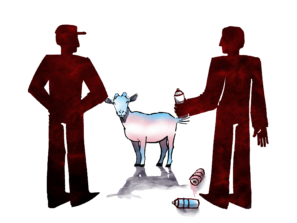For about a week in March, you couldn’t go on Facebook without seeing at least ten posts, fifteen new groups and another 20 event invitations all asking you to buy posters, repost videos and arrest a defunct Ugandan warlord. You’re probably sick of hearing Joseph Kony’s name. That’s why this column isn’t about Kony—it’s about us. Why did we react like we did, and why did the hype die down so quickly?
While there was an initial wave of support for Invisible Children, the campaign quickly became controversial. Critics of the campaign were angered, and for good reason. People whose only knowledge consisted of a twenty-seven minute propaganda video were being swept up in a self-righteous fever. Many people found it hard to believe that all the supporters had actually been overcome with a sudden urge to help Africa.
To some, Invisible Children’s supporters appeared to be promoting themselves, rather than the campaign. The way that Invisible Children asked for participation made it very difficult to not publicize one’s involvement. Reposting a video on Facebook made it appear as if one were trying to draw attention to themselves, rather than the situation in Uganda.
This was in no way true for everyone. Plenty of people were horrified to hear of the atrocities Kony and his small rebel force had committed and eager to help in any way they could.
But regardless of why the video was reposted so many times, the fact remained that the people reposting the video were uneducated about the situation in Central Africa. This raised an ideological question: should a person support a cause if they are not educated on it?
If a person can’t point out Uganda on a map, is there anything wrong with demanding that Kony be brought to justice? Joseph Kony is a grotesque war criminal and a theological lunatic. While the blind support of his arrest can appear to be morally questionable, uneducated supporters do seem to contribute to a good cause. There are no obvious detriments to their involvement–awareness is raised for their cause, and action is taken. So what if they’re not informed about the issue?
One argument against blind support is that people who are not knowledgeable about the issue will go about “fixing it” in the wrong way. In situations like the one in Uganda, blind support is dangerous. When I began to research Joesph Kony and Invisible Children, I was upset with what I found. The LRA (Kony’s Army) numbers in the hundreds, not thousands as Invisible Children implied. In fact, Kony isn’t even in Uganda anymore; he’s believed to have fled into neighboring Sudan. Seeing this, I was unable to understand why Invisible Children was supporting the Ugandan military, an organization infamous for human rights abuses including the use of child soldiers. Shocked by what I found, I began to research Invisible Children. I found that the majority of their funding goes towards advertisement and transportation; in short, Invisible Children is almost entirely activism based. Only thirty-one percent of their funding goes towards improvement on the ground in Africa. They do not contribute much help to the actual people suffering in Uganda.
Michael Deibert, author of “The Democratic Republic of Congo: Between Hope and Despair,” spoke critically of the blind support for Invisible Children. “By blindly supporting Uganda’s current government and its military adventures… Invisible Children is in fact guaranteeing that there will be more violence, not less, in Central Africa. I have seen the well-meaning foreigners do plenty of damage before, so that is why people understanding the context and the history of the region is important before they blunder blindly forward to ‘help’ a people they don’t understand,” he wrote in The Huffington Post.
After my research, I realized two things: I still wanted to contribute to the rectifying of the situation in Uganda and Central Africa. But I did not want to support Invisible Children. Since Invisible Children wants to see change happen on the ground in Uganda, it seems much more pertinent to support organizations that actually contribute the majority of their funding to the Ugandan people.
As with all things, rationality should overcomes zealousness. The only way to actually support a cause is with absolute conviction. One should support a cause to the level that they are involved in it, rather than to the level that it initially affects them.
Being involved in a cause demands that one researches the situation, and comes to understand its intricacies. Researching a cause is a safety net against blind support, and its inherent dangers. It lets one decide if one is truly passionate about the cause and leads one towards finding the right organizations and institutions to support.
When you see something that upsets you, you should by all means take action. The first step towards eradicating injustice is through education. But that education starts with you. Before you begin advocating a cause, research it yourself—find out what’s actually going on, and how you can fix.
Before you repost a video calling for the arrest of a defunct Ugandan warlord, at least do a Google search first—if you’re like me, you’ll be surprised at what you find.





